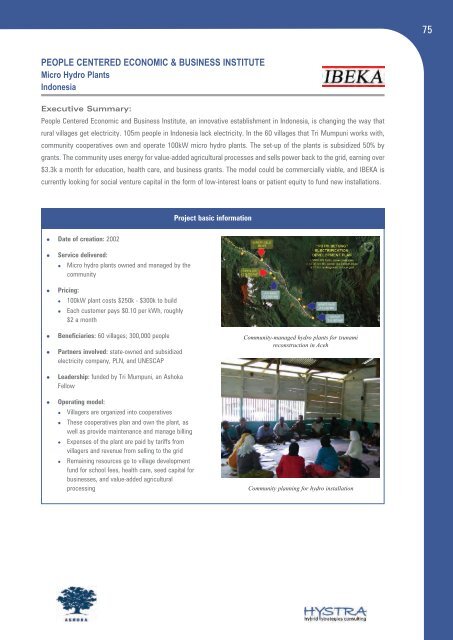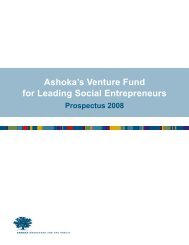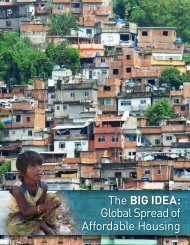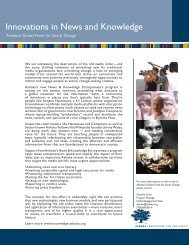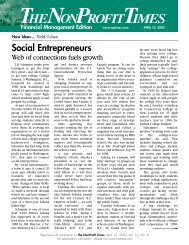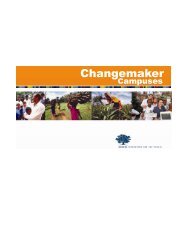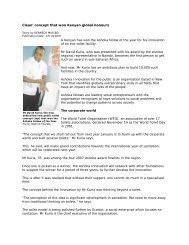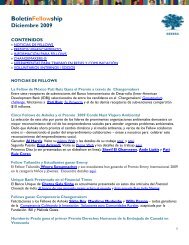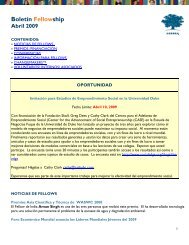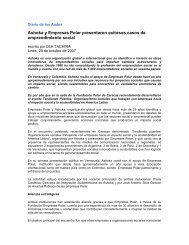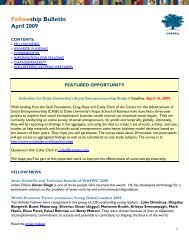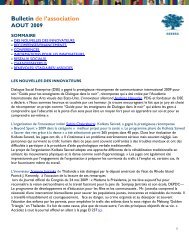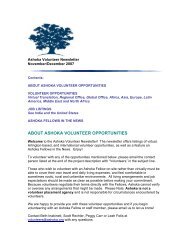Access to Energy for the Base of the - Ashoka
Access to Energy for the Base of the - Ashoka
Access to Energy for the Base of the - Ashoka
You also want an ePaper? Increase the reach of your titles
YUMPU automatically turns print PDFs into web optimized ePapers that Google loves.
PEOPLE CENTERED ECONOMIC & BUSINESS INSTITUTE<br />
Micro Hydro Plants<br />
Indonesia<br />
Executive Summary:<br />
People Centered Economic and Business Institute, an innovative establishment in Indonesia, is changing <strong>the</strong> way that<br />
rural villages get electricity. 105m people in Indonesia lack electricity. In <strong>the</strong> 60 villages that Tri Mumpuni works with,<br />
community cooperatives own and operate 100kW micro hydro plants. The set-up <strong>of</strong> <strong>the</strong> plants is subsidized 50% by<br />
grants. The community uses energy <strong>for</strong> value-added agricultural processes and sells power back <strong>to</strong> <strong>the</strong> grid, earning over<br />
$3.3k a month <strong>for</strong> education, health care, and business grants. The model could be commercially viable, and IBEKA is<br />
currently looking <strong>for</strong> social venture capital in <strong>the</strong> <strong>for</strong>m <strong>of</strong> low-interest loans or patient equity <strong>to</strong> fund new installations.<br />
� Date <strong>of</strong> creation: 2002<br />
� Service delivered:<br />
�� Micro hydro plants owned and managed by <strong>the</strong><br />
community<br />
� Pricing:<br />
� 100kW plant costs $250k - $300k <strong>to</strong> build<br />
�� Each cus<strong>to</strong>mer pays $0.10 per kWh, roughly<br />
$2 a month<br />
� Beneficiaries: 60 villages; 300,000 people<br />
� Partners involved: state-owned and subsidized<br />
electricity company, PLN, and UNESCAP<br />
� Leadership: funded by Tri Mumpuni, an <strong>Ashoka</strong><br />
Fellow<br />
� Operating model:<br />
� Villagers are organized in<strong>to</strong> cooperatives<br />
�� These cooperatives plan and own <strong>the</strong> plant, as<br />
well as provide maintenance and manage billing<br />
� Expenses <strong>of</strong> <strong>the</strong> plant are paid by tariffs from<br />
villagers and revenue from selling <strong>to</strong> <strong>the</strong> grid<br />
� Remaining resources go <strong>to</strong> village development<br />
fund <strong>for</strong> school fees, health care, seed capital <strong>for</strong><br />
businesses, and value-added agricultural<br />
processing<br />
Project basic in<strong>for</strong>mation<br />
Community-managed hydro plants <strong>for</strong> tsunami<br />
reconstruction in Aceh<br />
Community planning <strong>for</strong> hydro installation<br />
75


